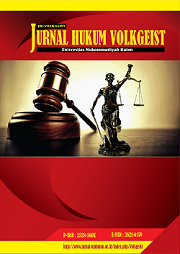Implementation of Women's Representation as Members of the General Election Commission Based on Law No. 7 of 2017 on General Elections.
DOI:
https://doi.org/10.35326/volkgeist.v8i1.4714Keywords:
Affirmative action, woman, general electionorganizerAbstract
The topic of women's quotas can be a good entry point to explore what limits and enhances substantive representation of women. Additionally, women's quotas are closely related to the debate on descriptive and substantive representation when associating quota policies, representation, and the effects of these quota policies. Women's representation in election organizers is crucial to ensure fair, equitable, and inclusive elections. Moreover, this is related to the issue of affirmative action. Affirmative action is a policy that provides special treatment to disadvantaged or marginalized groups, such as women, in order to enhance their representation in election organizers. This policy can take the form of quotas, reservations, or other affirmative programs. This research aims to analyze the Implementation and Factors affecting the fulfillment of the 30% Women's Representation quota in General Elections organizers in Indonesia based on Law No. 7 of 2017 regarding General Elections Research.
Downloads
References
Achmadi, A. (2010). Filsafat umum. Jakarta: Raja Grafindo Persada.
Alfiyah, N., & Rika, D. L. (2022). Pendidikan Politik Bagi Kelompok Perempuan di RT 01 RW 01 Desa Ellak Daya Kecamatan Lenteng Dalam Menghadapi Pilkades Serentak 2021. Darmabakti: Jurnal Pengabdian Dan Pemberdayaan Masyarakat, 3(1), 23–31.
Amatahir, Z., & Rehas, A. M. (2022). Tinjauan Hukum Pemberdayaan Hak Politik Perempuan: Legal Review of the Empowerment of Women’s Political Rights. Jurnal Media Hukum, 10(2), 98–109.
Aula, M. R. (2023). Isu-Isu Gender Dalam Keterwakilan (Ketimpangan Gender) dalam Kehidupan Politik Indonesia. Aufklarung: Jurnal Pendidikan, Sosial Dan Humaniora, 3(3), 190–200.
Bacchi, C. L. (1996). The politics of affirmative action:’Women’, equality and category politics. Sage.
Dahlerup, D. (2013). Women, quotas and politics. Routledge.
Hartono, S. S. P., Miqdad, M., Alamsyah, S. B., & Chairiyah, S. Z. (2023). Persepsi Perempuan Mengenai Fenomena Politik Dalam Pemilihan Kepala Desa Ngadas Kabupaten Malang. UNES Law Review, 5(4), 3735–3748.
Indra Syamsi, & Lolly Suhenty. (2012). Epilog dalam Perempuan perlemen dalam cakrawala politik Indonesia. In Perempuan perlemen dalam cakrawala politik Indonesia (1st ed.). Jakarta: Dian Rakyat.
Mangesti, Y. A., & Tanya, B. L. (2014). Moralitas hukum. Genta Publishing.
Marzuki, P. M. (2006). Penelitian Hukum. Jakarta: Kencana.
Pande, R., & Ford, D. (2012). Gender quotas and female leadership. Retrieved 10 October 2023 from http://hdl.handle.net/10986/9120
Puteri Seroja, & Azty Kirana. (2023). Analisis Kegagalan Terpenuhinya Kuota Tiga Puluh Persen Keterwakilan Perempuan Pada Pemilihan Umum Legislatif 2019 Di Kota Jambi. Universitas Jambi, Jambi.
Rawls, J. (2006). A Theory of Justice (Teori Keadilan), Dasar-dasar Filsafat Politik Untuk Mewujudkan Kesejahteraan Sosial Dalam Negara, diterjemahkan oleh. Uzair Fauzan Dan Heru Prasetyo, Pustaka Belajar, Yogjakarta.
Rembulan, D. (2023). Representasi Perempuan Di DPR-RI: Studi Perbandingan Sulawesi Utara Dan Kepulauan Bangka Belitung. Jurnal Indonesia Sosial Teknologi, 4(7), 844–854.
Saihu, M., & (Indonesia), D. K. P. P. (2015). Penyelenggara pemilu di dunia: sejarah, kelembagaan, dan praktik pemilu di negara penganut sistem pemerintahan presidensial, semipresidensial, dan parlementer. DKPP RI. Retrieved from https://books.google.co.id/books?id=AI5LzQEACAAJ
Soekanto, S., & Mamudji, S. (2015). Penelitian Hukum Normatif : Suatu Tinjauan Singkat. Jakarta: Rajawali Pers.
Strong, C. F. (2004). Konstitusi-Konstitusi Politik Modern-Kajian tentang Sejarah dan Bentuk-Bentuk Konstitusi Dunia [Modern Political Constitutions-Research on History and Forms of World Constitutions]. Nuansa Publishing dan Nusa Media Publishing, Bandung.
Surbakti, R. (1992). Memahami ilmu politik. Grasindo.
Talaohu, A. R. (2021). Partisipasi Politik Kaum Perempuan Dalam Pemilu Legislatif Di Kecamatan Ambalau Kabupaten Buru Selatan. BESTERKUNDE, 1(1), 15–28.
Ulya, M. T., & Huda, M. C. (2022). Pengawas Partisipatif Pemilihan Umum: Kajian Perspektif Tujuan Hukum dan Maslahah Mursalah. Jurnal Darussalam: Jurnal Pendidikan, Komunikasi Dan Pemikiran Hukum Islam, 14(1), 108–129.
Wijayanti, S. N., & Prasetyoningsih, N. (2009). Politik Ketatanegaraan. Lab Hukum Fakultas Hukum UMY, Yogyakarta.
Zumrotun Nazia. (2022). Memperhatikan Keterwakilan Perempuan 30% di KPU dan Bawaslu. Retrieved 10 October 2023, from https://rumahpemilu.org/memperhatikan-keterwakilan-perempuan-30-di-kpu-dan-bawaslu/
Downloads
Submitted
Accepted
Published
Issue
Section
License
Copyright (c) 2023 Muhammad Rizal Lampatta, Suartini, Anas Lutfi

This work is licensed under a Creative Commons Attribution-ShareAlike 4.0 International License.
- Author retains the copyright and grants Jurnal Hukum Volkgeist the right of first publication of the work simultaneously licensed under the Creative Commons Attribution-ShareAlike 4.0 License that allows others to share the work with an acknowledgment of the work's authorship and initial publication in this journal
- The author is able to enter into separate, additional contractual arrangements for the non-exclusive distribution of the journal's published version of the work (e.g., post it to an institutional repository or publish it in a book) with the acknowledgment of its initial publication in this journal.
- The author is permitted and encouraged to post his/her work online (e.g., in institutional repositories or on their website) prior to and during the submission process, as it can lead to productive exchanges, as well as earlier and greater citation of the published work (See The Effect of Open Access).









.png)































